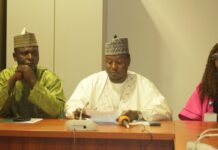The Nigerian government has approved the adoption, design and implementation of a domesticated, context-sensitive sector-wide approach as an innovative, holistic, and coordinated strategy for the improvement of health outcomes in the country.
A statement by the Director, Press and Public Relations, Deworitshe Patricia said, the Coordinating Minister, Federal Ministry of Health and Social Welfare, Professor Ali Pate made this known at the opening ceremony of the ongoing 64th National Council on Health (NCH), with the Theme: “Building a Resilient and Inclusive Healthcare System for a Healthy Nigeria” holding from 13th to 17th November, 2023 in Ado Ekiti, Ekiti State, Nigeria.
“We are redesigning the Basic Health Care Provision Fund (BHCPF), established by NHA 2014, to become more effective and efficient in driving the strategic shifts and priority initiatives that will see us moving towards accomplishing our ambitious but achievable goals and objectives,” he said.
Prof Pate reiterated the efforts of the government to put in place the necessary structure and framework to effectively and efficiently coordinate programmes to address the wider determinants of health since it is realized that a lot of the determinants of health are outside the direct control of the Health Sector.
According to him, “The Sub-Themes were carefully chosen in alignment with the Renewed Hope Agenda to highlight the priorities of the sector; encourage us to take stock of our journey, putting into consideration the reality of the times; and remind us of our ultimate goal of achieving a system that ensures that all people have access to needed health services (including prevention, promotion, treatment, rehabilitation and palliation) of sufficient quality to be effective while also ensuring that the use of these services does not expose the user the financial hardship.”
The Minister opined that, health of the people is a fundamental human right, “It is a measure of our commitment to equity, justice, and the dignity of every individual. Achieving Universal Health Coverage (UHC) is not a choice; it is an obligation, a promise to provide quality healthcare to all regardless of their socio-economic status. It is the embodiment of our vision for a healthier and more prosperous nation and a strategic advantage for us as a nation.”
Addressing some of the health issues, Prof. Pate said that the Ministry has embarked on a ‘Diagnosis to action’ system-wide initiative, taking briefs from all levels and consulting with all relevant stakeholders to achieving Universal Health Coverage, adding that, this has led to a 4-point blueprint with cross-cutting enablers: Effective governance; Efficient, equitable and quality health systems; Unlocking value chains and Health security.
The Minister said the Ministry remains at the forefront, to continue to maintain stability in our health sector and meet the health needs of our growing population and to collectively change our narratives and foster the progress which we desire.
The Minister of State for Health, Dr. Tunde Alausa said, “We must take a pragmatic approach on the way we want to respond to our current problems with Human Resource for health, while it may be difficult to prevent the migration of individuals for greener pastures, we can respond by increase pool of health workers that we graduate from our institutions on annual basis.
“This will reverse the negative impact of the ‘Japa Syndrome’ that we are currently witnessing,” he added.
Declaring the 64th NCH open, Governor of Ekiti State, Mr. Biodun Oyebanji recognised said evidence-based research and development are the foundation of progress in every sector including healthcare.
“Through research, we can generate data to guide decision-making and enhance our understanding of health challenges,” he said.
In his goodwill message, the World Health Organisation (WHO) representative in Nigeria, Dr. Walter Kazadi Mulombo, said his expectations for NCH is to leverage on the strengths and opportunities on each tier of government to come up with feasible, less complex and sustainable strategies that will work for the Federal and State Governments in overcoming challenges under the Health Sector Renewal Investment Program.
Dr. Mulombo reiterated WHO commitment towards providing technical support as a member State Organisation towards the healthcare needs of the country.
END












































